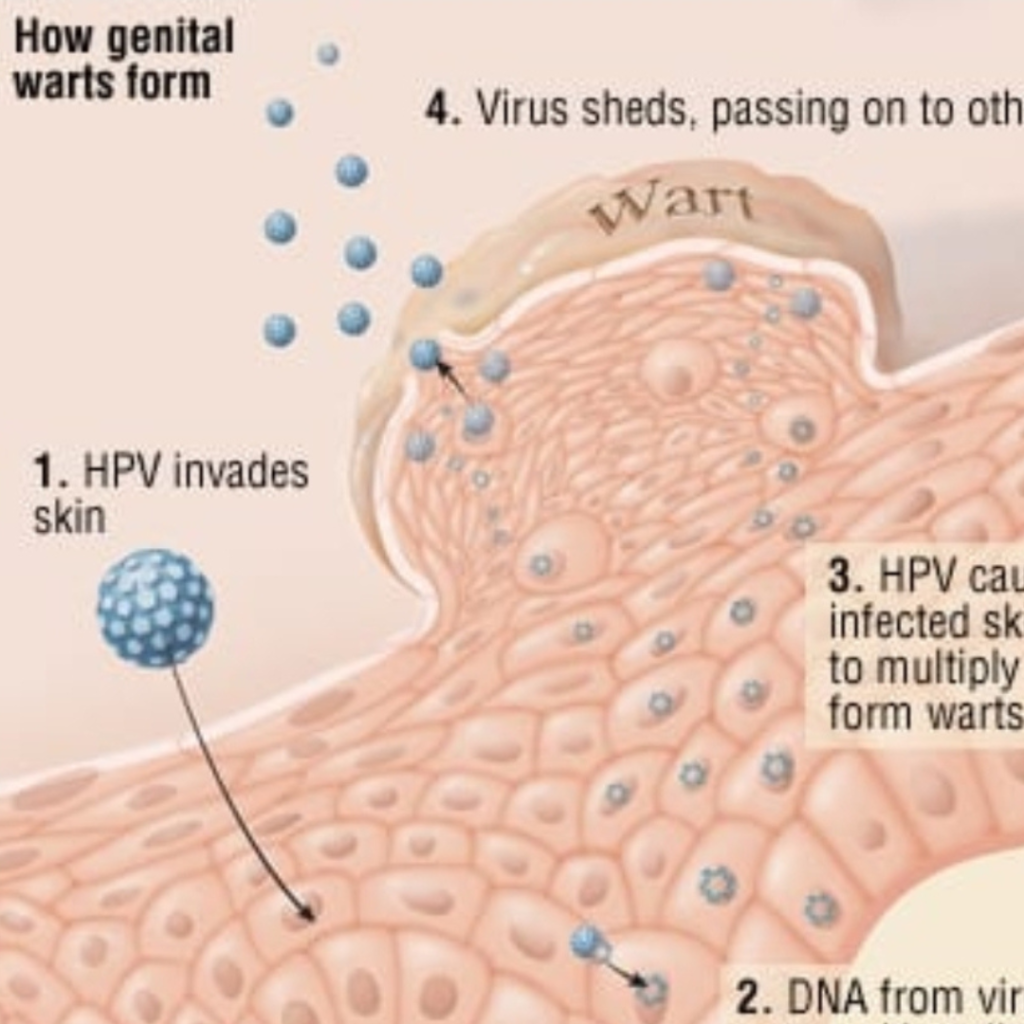What is Anogenital Warts
Anogenital warts are small growths that can appear on the vulva, vagina, penis, or anus. These warts can be skin-colored or pink and are caused by the human papillomavirus (HPV), which is transmitted through sexual contact. Anogenital warts are also referred to as genital warts.
Is HPV dangerous?
While the type of HPV that leads to most genital warts is not usually harmful, other strains of the virus can cause cancer of the cervix, penis, or anus.
Symptoms of Anogenital Warts
Most individuals with genital warts do not experience any symptoms aside from the warts themselves. However, some may experience itching, burning, or tenderness.

Diagnosis
There is no specific test to detect genital warts. Typically, the doctor can detect genital warts through a physical exam. In some cases, a biopsy may be conducted to understand the warts further.
Treatments for Anogenital Warts
Fortunately, several medications help treat genital warts, including topical medications that gradually eliminate warts and stimulate the body to attack the virus. Some other treatments for large or recurring warts include:
- Cryotherapy: A medical procedure that uses chemicals to freeze the warts.
- Electrocautery: A medical procedure that uses electricity to burn warts.
- Traditional surgery
- Laser surgery: A medical procedure that uses light to destroy any warts.
- Ultrasound surgery: A medical procedure that uses sound waves to break and remove warts.
Can I Get Treated if I am Pregnant?
It’s crucial to inform your doctor about your pregnancy if you are undergoing treatment for genital warts, as some procedures are unsafe during pregnancy.
Related: A Guide to Pregnancy Nutrition
What Can I Expect After the Treatment?
After the treatment, your doctor will recommend regular screening to ensure there is no recurrence of warts since HPV can remain active and cause warts again.
Prevention of Anogenital Warts
You can protect yourself from most strains of the HPV virus through vaccines. Other helpful measures include:
- Abstaining from sexual activity
- Using condoms
However, it’s important to mention that either methods are 100% effective in preventing transmission of the virus.
Related Q&A
Q1. Can anogenital warts go away on their own?
Yes, it is possible for anogenital warts to go away without treatment. The body’s immune system can sometimes clear the virus that causes the warts over time, leading to their disappearance. However, the duration for warts to resolve naturally can vary, and it’s recommended to seek medical advice for proper evaluation and potential treatment options.
Q2. Are anogenital warts only transmitted through sexual contact?
While sexual contact is the primary mode of transmission for anogenital warts, it is not the only way they can spread. Direct skin-to-skin contact with an infected area can also lead to the transmission of the human papillomavirus (HPV) responsible for these warts. It’s important to practice safe sex and take precautionary measures to reduce the risk of transmission.
Q3. Can anogenital warts reappear after treatment?
Yes, anogenital warts can reappear even after successful treatment. This is because the virus that causes the warts, HPV, can persist in the body even after removing visible warts. It’s important to continue practicing safe sex and maintaining good hygiene to reduce the risk of recurrence.
Q4. Are anogenital warts and genital herpes the same thing?
No, anogenital warts and genital herpes are caused by different viruses and are not the same condition. HPV causes anogenital warts, while genital herpes is caused by the herpes simplex virus (HSV). Although both conditions are sexually transmitted and can cause lesions in the genital area, they have distinct characteristics, treatment approaches, and long-term implications.
Q5. Can anogenital warts affect pregnancy?
Anogenital warts can potentially affect pregnancy, although the impact varies. If a pregnant woman has active warts at the time of delivery, there is a small chance of transmitting the virus to the newborn, which can result in respiratory papillomatosis. It is important for pregnant women with anogenital warts to consult with their healthcare provider for appropriate management and monitoring.
Q6. Can anogenital warts be prevented through vaccination?
Yes, vaccination against certain types of HPV can help prevent anogenital warts. Vaccines such as the HPV vaccine can protect against the specific strains of HPV that are most commonly associated with anogenital warts and cervical cancer. It’s recommended to discuss vaccination options with a healthcare professional for appropriate guidance and administration.
Q7. Are anogenital warts only transmitted through sexual contact?
While sexual contact is the primary mode of transmission for anogenital warts, it is not the only way they can spread. Direct skin-to-skin contact with an infected area can also lead to the transmission of the human papillomavirus (HPV) responsible for these warts. It’s important to practice safe sex and take precautionary measures to reduce the risk of transmission.
Q8. Can anogenital warts be transmitted through oral sex?
Yes, anogenital warts can be transmitted through oral sex. If a person has anogenital warts and engages in oral-genital contact, there is a risk of transmitting the human papillomavirus (HPV) to the mouth or throat of their partner, potentially leading to the development of oral warts.
Get Help with Dr. Mozhgan
If you’re searching for one of the best gynecologists in Dubai, meet Dr. Mozhgan Sayyad. She is a prolific doctor with over 25 years of invaluable experience and a proud member of prestigious organizations like the European Society of Aesthetic Gynecology [ESAG], the International Society of Sexual Medicine [ISSM], and the European Society of Sexual Medicine [ESSM].
Dr. Mozhgan is well known for her tremendous service in aesthetic surgeries & non-surgeries, female sexual dysfunction, and other gynecology & obstetrics issues [including STD, Menopause treatment, HPV, and more].


